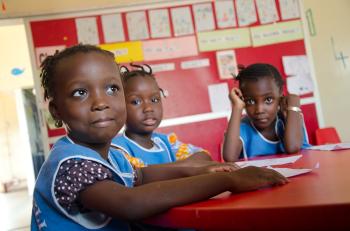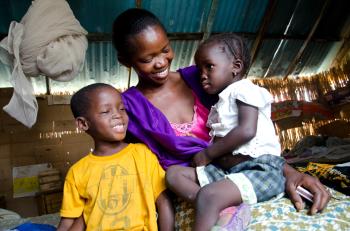Food insecurity and lacking education endanger the future of children
-65985_jpg.jpg?width=800)
The SOS Kindergarten gives children a good start in life (photo: C. Ladavicius).
The overall literacy rate in Senegal is about 50 per cent, though it is higher in urban areas, and lower in rural regions and for women. Around 85 per cent of children are enrolled in primary school, but the dropout rate is extremely high. This is usually due to the difficult situation of the child’s family, meaning that the child either has to work to help support the family, or simply that the parents are unable to supervise the child and make sure he or she attends school regularly and has all the materials needed.
Sometimes parents also take their children out of school because they want them to learn their own profession. They may need the extra pair of hands, for example during harvest times, or they may believe that their children will have better chances of fending for themselves if they learn to work at a young age. Another common practice in Senegal is to entrust young boys into the care of a “marabout”, or Koranic teacher. While this is a longstanding and respected tradition in Senegal, in recent years many marabouts have been accused of exploiting children, sending them out to beg in the streets for their own personal gain.
Families need a comprehensive set of support measures
The socioeconomic factors that affect the healthy development of a child are complex. Family size is one factor: in Louga, 37 per cent of households consist of eleven people or more. This means that conditions in the home are often overcrowded, and parents find it difficult to provide for each child, both in material terms and in terms of attention and care. There are also an estimated 30,000 children who have lost both parents, in many cases due to AIDS. There are the so-called “fakhmans” – children who run away from their home or from their religious teacher, and fend for themselves on the streets. Children with disabilities are often discriminated against. In many regions of Senegal, twins are regarded with a mixture of fear and awe – sometimes they are accused of having evil powers, thus putting them at great risk of abandonment.
What we do in Louga
-65450_jpg.jpg?width=800)
Thanks to the SOS Family Strengthening Programme, this mother of five has acquired skills to set up a small business from home (photo: C. Ladavicius).
For children from the region who can no longer live with their parents, ten SOS families can provide a loving home. In each family, the children live with their brothers and sisters, affectionately cared for by their SOS mother.
The children attend the SOS Kindergarten together with children from the neighbourhood. This ensures that children from SOS families make friends and are integrated into the local community from a young age. The children then go on to complete their primary education at the SOS Hermann Gmeiner School, which is attended by up to 600 pupils.
When young people reach an age where they are ready to move out of the family home, the SOS Youth Programme makes shared accommodation available. Qualified SOS co-workers accompany and support the young people on their journey to becoming independent adults, for example by providing guidance and support in finding employment or training opportunities.
Our SOS Vocational Training Centre here in Louga offers training courses in a number of trades. Their qualification will help the young people find employment and integrate into society and working life.